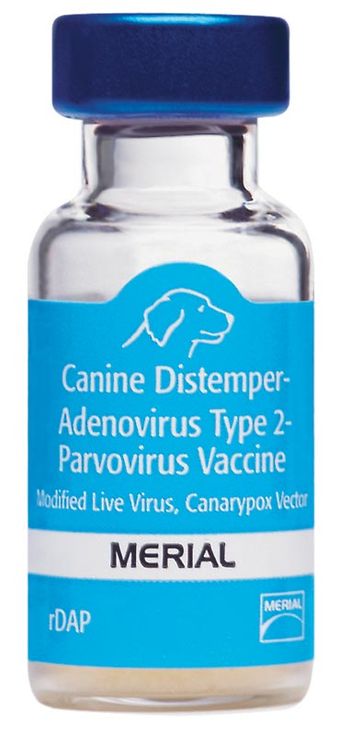
DULUTH, GA.-Merial announces the launch of the Recombitek C3? canine vaccine, a new canine product approved to protect against distemper, parvovirus and adenovirus-2.

DULUTH, GA.-Merial announces the launch of the Recombitek C3? canine vaccine, a new canine product approved to protect against distemper, parvovirus and adenovirus-2.
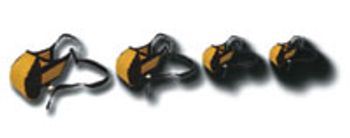
This muzzle is made from padded Dupont fabric, textilene mesh webbing and an extra-strength adjustable snap.

Vedco introduces a unique handheld mobile tonometry unit for measuring intraocular pressure in animals that can be a tip-off for the onset of glaucoma.
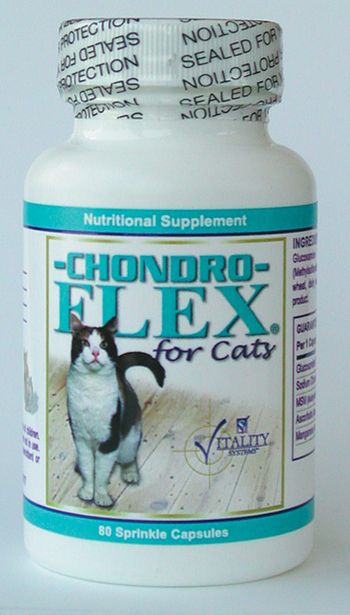
Vitality Systems introduces flavored joint-care capsules with the launch of Chondro-Flex? Sprinkle Caps for Cats.

Blacksburg, Va.-Renowned researcher dr. gerhardt schurig has secured virginia-maryland regional college of veterinary medicine's top post, taking on the role of dean.
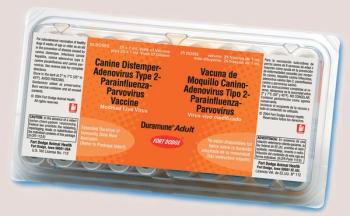
OVERLAND PARK, KAN.-Fort Dodge Animal Health received approval of Duramune? Adult, the first USDA-licensed vaccine with three-year virus challenge data against a trio of deadly canine diseases; canine parvo (CPV), canine distemper (CDV) and canine adenovirus (CAV).

All-Pro Imaging introduces a quartet of CR scanners to the veterinary market that are suitably sized and priced for the private office.

Tri-Tronics, Inc. introduces the ViceBreaker? H1, a remote controlled electronic collar designed to solve most unwanted horse vices.

Novartis Animal Health U.S., Inc., adds the new VICRYL Plus Antibacterial (polyglactin 910) Suture to its line of sutures.

Synbiotics announces the launch of its newly revised and updated Web site at www.synbiotics.com.

Tahitian Noni launches Equine Essentials, a liquid dietary supplement, designed to enhance the endurance and performance of horses.

Jorgensen Laboratories, Inc., introduces the AdvanTive IV catheter.

Jorgensen Laboratories, Inc. introduces the Marq-Easy Thermoplastic splinting material. Jorgensen's thermal plastic material is heated in hot water until it becomes soft.

Derungs Medical Lighting introduces the DL-122 hand-held ring magnifier developed specifically for dermatologists.

Intelligent Content Corp. launches Vetsuite for Windows V2.10, a network-capable version of its client education handout generator.

Securos Veterinary Orthopedics offers a meniscus grabbing forceps that is ideal for dealing with the meniscus during cruciate repair surgery.

A group of lawyers and veterinarians launched a new service that provides high-quality, short, quarterly reports on legal cases involving animals.

Bio-Pro Research, LLC releases Urine-Off?, a spray designed to remove odors and stains from pets.

IDEXX Cornerstone Practice Management System users now have more options for downloading reference laboratory results into patient records, according to IDEXX.
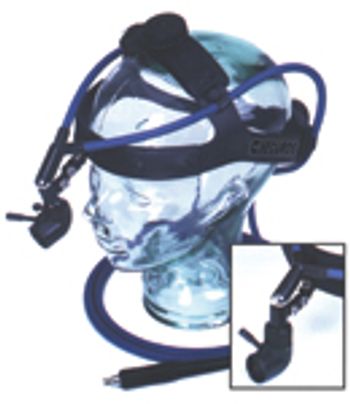
Securos introduces a line of surgical headlights in fiber optic and solid-state options.

VetCare Veterinary Supplies introduces the new VetSet, IV administration sets that are designed and manufactured for veterinary use

ImproMed releases the Infinity Tablet PC for inventory control.

Sharn Veterinary Inc. offers the Cardell? MultiModel 9403 Multiparameter Veterinary Monitor.

Jorgensen Laboratories, Inc. introduces the SurgiClose? Skin stapler system.

Wysong Corp. introduces E-Biotic?, a highly palatable sprinkle-on formulation designed to ensure the presence of nutrients commonly lacking in rations.
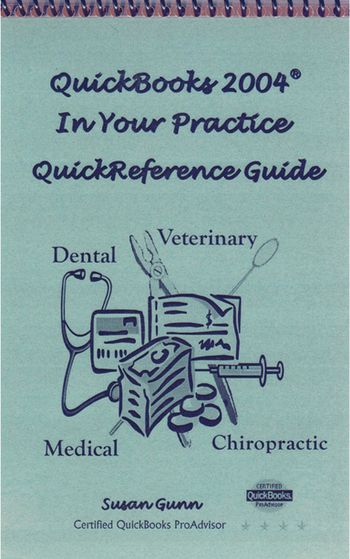
The QuickReference Guide by Susan Gunn complements QuickBooks in Your Practice Workbooks.

Derungs Medical Lighting introduces the functional Halux 50 SX gooseneck halogen light featuring a flexible, yet sturdy gooseneck for accurate positioning for a myriad of healthcare requirements.

SolidTech received licenses to produce and sell three cattle vaccine products.

Wysong Corp.'s line of equine products, designed to mimic archetypal nutrition, now includes Equine EFA?.

Atlanta-Gov. Sonny Perdue issued a proclamation making May 4 Veterinarian Day in the state. The proclamation was declared to honor veterinary professionals and show support for the philanthropic work of the Georgia Veterinary Medical Association (GVMA) Foundation.